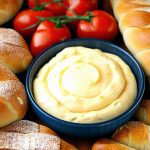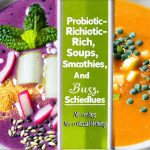Dealing with acid reflux—or heartburn—can significantly impact your daily life, particularly when it comes to enjoying something as simple as breakfast. Many traditional breakfast foods are notorious triggers: citrusy juices, greasy bacon, spicy sausages, even seemingly innocuous tomatoes can set off a cascade of unpleasant symptoms. However, this doesn’t mean you have to resign yourself to bland or unsatisfying mornings. A reflux-safe breakfast can be delicious and energizing, requiring just a little knowledge about food triggers and thoughtful ingredient substitutions. The key lies in understanding how certain foods affect acid production and esophageal health, and then creatively adapting your favorite recipes or discovering new ones that prioritize gentle digestion.
The goal isn’t complete deprivation; it’s informed choice. It’s about finding breakfast options that won’t exacerbate reflux symptoms while still providing the nutrients you need to start your day right. This often means focusing on foods that are low in acidity, fat, and spice, and high in fiber (which can actually help absorb stomach acid). Beyond specific foods, portion control is also vital. Overeating, even with reflux-friendly items, can put pressure on the lower esophageal sphincter (LES), increasing the likelihood of heartburn. This article will explore a range of breakfast ideas that are both safe for those managing reflux and genuinely enjoyable, offering practical tips and recipes to help you reclaim your mornings.
Understanding Reflux Triggers & Safe Food Choices
Acid reflux occurs when stomach acid flows back up into the esophagus, causing irritation and discomfort. While individual triggers vary, some foods consistently contribute to this issue. High-fat foods are a major culprit because they slow down digestion and relax the LES, allowing acid to escape. Similarly, acidic foods like citrus fruits, tomatoes, and vinegar can directly irritate the esophageal lining. Spicy foods also increase stomach acid production and weaken the LES. Caffeine and alcohol have similar effects, as do carbonated beverages which introduce gas into the digestive system, increasing pressure. Finally, mint—while seemingly harmless—can relax the LES, making reflux more likely for some individuals.
Navigating these triggers requires a bit of detective work to identify your personal sensitivities. What bothers one person might not bother another. However, generally safe choices include: – Oatmeal (prepared with water or low-fat milk) – Bananas – Melon – Whole wheat toast with peanut butter (in moderation) – Eggs (cooked without excessive fat – poached, boiled, or scrambled with minimal oil) – Lean protein sources like chicken breast or turkey bacon (again, prepared with limited fat).
The emphasis should be on gentle digestion. Foods that are easy to digest require less stomach acid and put less strain on the LES. Fiber plays a crucial role here, as it helps neutralize stomach acid and keeps things moving smoothly through the digestive system. Hydration is also important; water helps dilute stomach acid and aids in digestion. Remember, small, frequent meals are often better tolerated than large ones, reducing the risk of overfilling the stomach and triggering reflux. Are you tolerating foods that harm long term?
Delicious & Reflux-Friendly Breakfast Options
There’s a wide range of breakfast options that can be adapted to suit a reflux-conscious diet without sacrificing taste. Oatmeal, for instance, is incredibly versatile. Instead of adding acidic fruits like oranges or grapefruit, opt for sliced bananas, blueberries (in moderation), or a drizzle of maple syrup. Using water instead of milk can also reduce the risk of triggering symptoms, though low-fat milk is generally well-tolerated by most people. Similarly, eggs are a fantastic source of protein but should be prepared in a way that minimizes fat intake. Poaching or boiling eggs are excellent choices; if scrambling, use only a tiny amount of olive oil.
Whole wheat toast with natural peanut butter (avoiding sugary spreads) can also be a satisfying and safe option. The whole grains provide fiber, while the peanut butter offers protein and healthy fats. Just be mindful of portion sizes – excessive amounts of peanut butter can still contribute to reflux in some individuals. Another excellent choice is a smoothie made with bananas, spinach (a surprisingly neutral flavor), almond milk, and a small amount of protein powder. Avoid adding citrus fruits or pineapple, which are known triggers. The key is to focus on bland, easily digestible ingredients and prepare them in ways that minimize fat content. If you’re looking for more gut-friendly options, morning smoothies might be a good starting point.
Oatmeal Variations for Every Palate
Oatmeal doesn’t have to be boring! Experimenting with different toppings and flavors can make it a truly enjoyable breakfast experience. Here’s how: 1. Classic Banana & Cinnamon: Combine ½ cup of rolled oats with 1 cup of water or low-fat milk. Cook according to package directions. Top with sliced banana, a sprinkle of cinnamon, and a drizzle of maple syrup. 2. Blueberry Bliss: Prepare oatmeal as above. Add ¼ cup of blueberries (fresh or frozen) after cooking. A small amount of almond butter can also be added for extra protein and flavor. 3. Apple & Spice: Dice ½ apple into small pieces. Cook with the oats, adding a pinch of cinnamon and nutmeg.
Remember to avoid ingredients like raisins (can be acidic), chocolate chips (high in fat), or nuts (can trigger symptoms in some). If you find that even oatmeal causes reflux, try switching to quinoa flakes – they have a similar texture but may be better tolerated by some individuals. Experimenting with different types of oats (rolled, steel-cut, quick-cooking) can also help determine which variety works best for your digestive system. Ultimately, the goal is to create an oatmeal breakfast that’s both delicious and gentle on your stomach. Best breakfast ideas are available if you have specific food intolerances.
Eggcellent Choices: Preparing Eggs Safely
Eggs are a nutritional powerhouse, providing protein, vitamins, and minerals. However, the way you prepare them significantly impacts their reflux-friendliness. Frying eggs in butter or oil should be avoided, as the high fat content can trigger symptoms. Instead, opt for poaching, boiling, or scrambling with minimal olive oil. Poached eggs are arguably the safest option, as they require no added fat at all.
If you prefer scrambled eggs, use a non-stick pan and just a tiny spritz of olive oil. Avoid adding ingredients like cheese, onions, or tomatoes, which can exacerbate reflux. Seasoning with herbs like parsley or chives is perfectly safe. A simple egg white omelet with spinach is another excellent choice – it provides protein without the fat content of whole eggs. Consider pairing your eggs with a slice of whole wheat toast for a more complete and satisfying breakfast. GERD-friendly breakfast options are available too.
Smoothie Solutions: Blending Your Way to Relief
Smoothies offer a quick, convenient, and customizable way to enjoy a reflux-safe breakfast. The key is to focus on bland, easily digestible ingredients while avoiding triggers like citrus fruits and pineapple. A base of almond milk or low-fat yogurt provides liquid and calcium. Bananas are an excellent addition, offering sweetness and potassium. Spinach blends surprisingly well into smoothies without altering the flavor significantly – it’s a great way to sneak in some extra nutrients.
A small amount of protein powder can help keep you feeling full and energized. Avoid using flavored protein powders that contain artificial sweeteners or acidic ingredients. Here’s a simple recipe: – 1 frozen banana – ½ cup almond milk – 1 handful spinach – 1 scoop unflavored protein powder Blend until smooth. You can also add a tablespoon of almond butter for extra healthy fats (in moderation). Remember to sip your smoothie slowly – gulping it down can introduce air into the digestive system, potentially triggering reflux. Can skipping breakfast aggravate IBS symptoms? And finally, be mindful of natural sugars, even in smoothies.


















